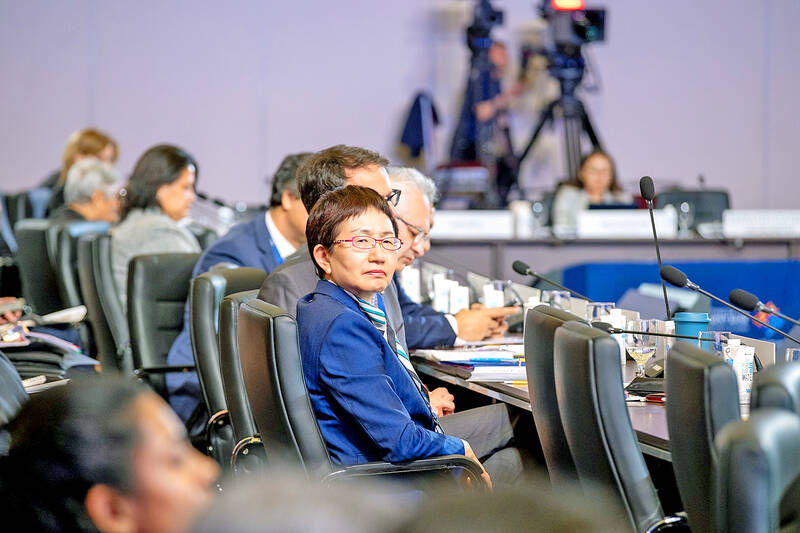Minister of Finance Chuang Tsui-yun (莊翠雲) protested Taiwan’s designation as “Taipei, China” at the Asian Development Bank’s (ADB) annual meeting, the Ministry of Finance said yesterday.
A ministry official in Chuang’s delegation to the meeting in Incheon, South Korea, said by telephone that Chuang repeated Taiwan’s demand to correct the name and voiced “our disagreement over the unilateral alteration of our membership designation.”
Established in 1966, the bank is owned by 68 members, with 49 from the region. Chuang serves as a board governor.

Photo courtesy of Asian Development Bank
Taiwan was one of the bank’s founding members, but it has been called “Taipei, China” since 1986, when the People’s Republic of China joined the bank.
Chuang protested the designation during her speech, saying that Taiwan has fulfilled its obligations and responsibilities as a member of the bank, the ministry said.
She urged ADB member nations to respect each other and allow Taiwan to participate in the bank’s activities on an equal footing.
On its Web site, the Manila-headquartered bank says that Taiwan has provided it with US$1.54 billion in capital as of Dec. 31 last year, and has also contributed or committed US$133.43 million to the bank’s special funds since becoming a member.
A total of 1,102 goods, works and related service contracts worth US$1.51 billion, and 83 consulting contracts valued at US$49.67 million, have been awarded to contractors, suppliers and consultants from “Taipei, China,” the Web site says.
The annual meeting was held from Tuesday through Friday under the theme of “Rebounding Asia: Recover, Reconnect and Reform.”
The ministry official said that Chuang discussed a range of topics at the annual meeting, with a particular focus on climate change, regional cooperation and gender equality.
She urged the bank to make stronger and more effective efforts to build climate resilience for environmentally vulnerable developing member countries, such as small island states, the official said.
Chuang also stressed the importance of bolstering domestic resource mobilization among developing member countries to improve their capacity to collect taxes and other revenue to provide better public services and economic support.
Regarding gender equality, Chuang said that Taiwan has been ahead of its peers on the issue and was willing to share its experience with its partners.
Chuang and central bank Deputy Governor Chu Mei-lie (朱美麗), who is Taiwan’s alternate governor to the ADB, are next to attend the 63rd annual governors’ meeting of the Central American Bank for Economic Integration (CABEI) in the Dominican Republic from Thursday to Saturday.
Chuang is to participate in her capacity as a governor at the CABEI, the ministry said.
Taiwan joined the CABEI in 1992 under its official Republic of China name as a non-regional member, with an 11.09 percent stake in the bank, the highest among the body’s seven non-regional members.

MAKING WAVES: China’s maritime militia could become a nontraditional threat in war, clogging up shipping lanes to prevent US or Japanese intervention, a report said About 1,900 Chinese ships flying flags of convenience and fishing vessels that participated in China’s military exercises around Taiwan last month and in January have been listed for monitoring, Coast Guard Administration (CGA) Deputy Director-General Hsieh Ching-chin (謝慶欽) said yesterday. Following amendments to the Commercial Port Act (商港法) and the Law of Ships (船舶法) last month, the CGA can designate possible berthing areas or deny ports of call for vessels suspected of loitering around areas where undersea cables can be accessed, Oceans Affairs Council Minister Kuan Bi-ling (管碧玲) said. The list of suspected ships, originally 300, had risen to about 1,900 as

Japan’s strategic alliance with the US would collapse if Tokyo were to turn away from a conflict in Taiwan, Japanese Prime Minister Sanae Takaichi said yesterday, but distanced herself from previous comments that suggested a possible military response in such an event. Takaichi expressed her latest views on a nationally broadcast TV program late on Monday, where an opposition party leader criticized her for igniting tensions with China with the earlier remarks. Ties between Japan and China have sunk to the worst level in years after Takaichi said in November that a hypothetical Chinese attack on Taiwan could bring about a Japanese

MORE RESPONSIBILITY: Draftees would be expected to fight alongside professional soldiers, likely requiring the transformation of some training brigades into combat units The armed forces are to start incorporating new conscripts into combined arms brigades this year to enhance combat readiness, the Executive Yuan’s latest policy report said. The new policy would affect Taiwanese men entering the military for their compulsory service, which was extended to one year under reforms by then-president Tsai Ing-wen (蔡英文) in 2022. The conscripts would be trained to operate machine guns, uncrewed aerial vehicles, anti-tank guided missile launchers and Stinger air defense systems, the report said, adding that the basic training would be lengthened to eight weeks. After basic training, conscripts would be sorted into infantry battalions that would take

DEEP-STRIKE CAPABILITY: The scenario simulated a PLA drill that turned into an assault on Taiwan’s critical infrastructure, with the launchers providing fire support Taiwan yesterday conducted this year’s first military exercises at Longsiang Base in Taichung, demonstrating the newly acquired High Mobility Artillery Rocket System’s (HIMARS) ability to provide fire support and deep-strike capabilities. The scenario simulated an attack on Penghu County, with HIMARS trucks immediately rolling into designated launch areas and firing barrages at the Wangan (望安) and Cimei (七美) islands, simulating the provision of fire support against invading forces. The HIMARS are supposed to “fire and leave,” which would significantly increase personnel and equipment survivability, a military official said. The drill simulated an exercise launched by the Chinese People’s Liberation Army (PLA) Eastern